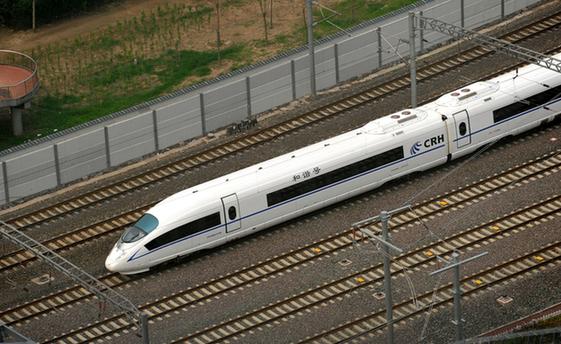
The first bullet train left Shanghai at 3 p.m. Thursday, beginning a one-day tale of two cities on the Beijing-Shanghai High-Speed Railway. [Photo/Xinhua]
Chinese Ministry of Railways rejected Japan's allegation that China had infringed on intellectual property rights concerning high-speed rail technology.
The complaint, filed by East Japan Railway Co. and Kawasaki Heavy Industries Ltd follows China's applications for its high-speed railway patents in countries including United States, Brazil, Russia, Japan and some European nations.
Wang Yongping, the spokesman for the Ministry, said on Thursday that China had independently developed the technology which it was applying patents for. The Japanese accusation displayed a "lack of confidence", he said.
Tadaharu Ohashi, chairman of Kawasaki Heavy Industries Ltd, said last week that the company would take legal action if China's high-speed train patents breached contracts signed between Japan and China.
Kawasaki Heavy Industries, together with East Japan Railway Co., exported the technology for a 200-km/h train to China in 2004. The CSR Corp Ltd's Qingdao Sifang Co Ltd, in partnership with Kawasaki Heavy Industries, produced the train, called CRH2, in China.
CSR later developed, on its own, a 300-350 km/h train and the CRH380A train with a designed top speed of 380 km/h, the China Daily reported.
"The strong reaction of some Japanese, without even knowing exactly what patents China is filing for, shows a fragile state of mind and a lack of confidence", Wang said.
Visiting Japanese Foreign Minister Takeaki Matsumoto also mentioned the issue to his Chinese counterpart Yang Jiechi on July 4. Yang made it clear that China developed the system through "its own innovations," Wang said.
He said China absorbed foreign technologies but also innovated them.
Compared to the CRH2 train, produced with technology imported from Kawasaki Heavy Industries Ltd, the CRH380A train for the Beijing-Shanghai route operates at much higher speeds.
Among other differences, the CRH380A has a derailment factor of only 0.13, compared to 0.73 for the CRH2, and air resistance at the front of the train is more than 15 percent less, Wang said.
It is ridiculous, he said, for some Japanese to say that China stolen technology from the Shinkansen, Japan's bullet train.
"The Shinkansen and the Beijing-Shanghai high-speed railway are on two different levels. There are huge differences in terms of speed, comfort and technology."
Countries should continue to improve technology to become leaders in the field, he added.
"What China did in boosting rail speed from 250 km/h to 350 km/h is important and similar to progress made when Japan raised train speed, enlightened by European technology, from 100 km/h to 200 km/h," he said.





